Innovation key to moving the dial on disability employment
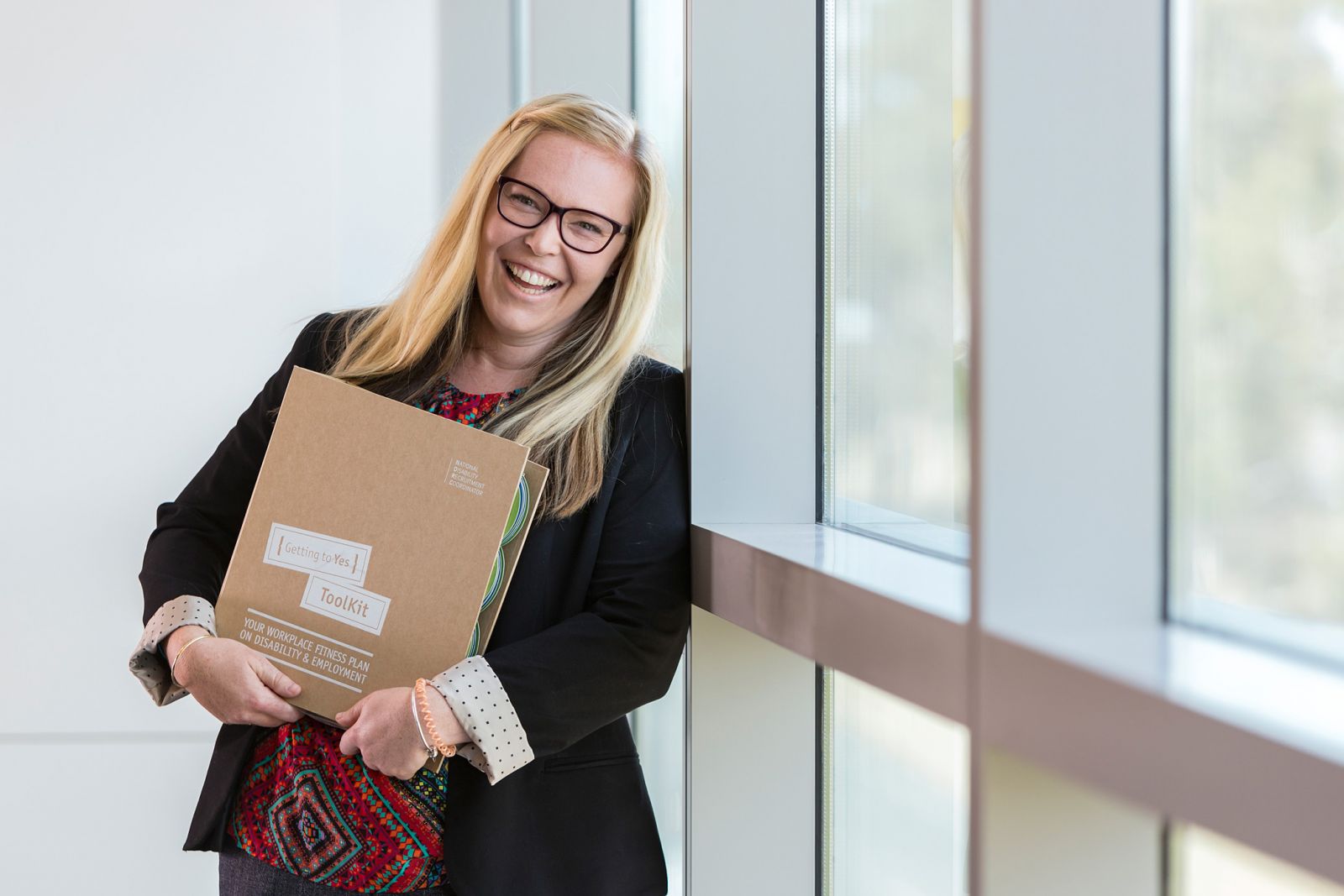
4.4 million Australians, or one in five, live with disability; a number expected to grow with an ageing population.
In contrast, a majority of businesses underrepresent this growing consumer base in their workforce as people with disability are half as likely to be employed compared to people without disability1.
Staff shortages facing one in five businesses2 combined with the employment gap for people with disability makes the need for access and inclusion clear, especially in workplace policies, employment practices, physical spaces and work culture.
The Australian Government’s JobAccess program delivers a range of supports to help bridge this gap.

Australia’s hub for disability employment information
In July 2006, the Australian Government launched JobAccess in response to an Australian Human Rights Commission report that recommended setting up a national one-stop information shop to support people with disability and employers.
The report also outlined the need for a wide-ranging workplace modifications scheme to foster equitable access to employment for people with disability.
Over the past 15 years, JobAccess has been the first port of call on everything related to disability employment.
The program has assisted more than 384,000 people – including jobseekers with disability, employers and service providers – with expert advice, support and information.
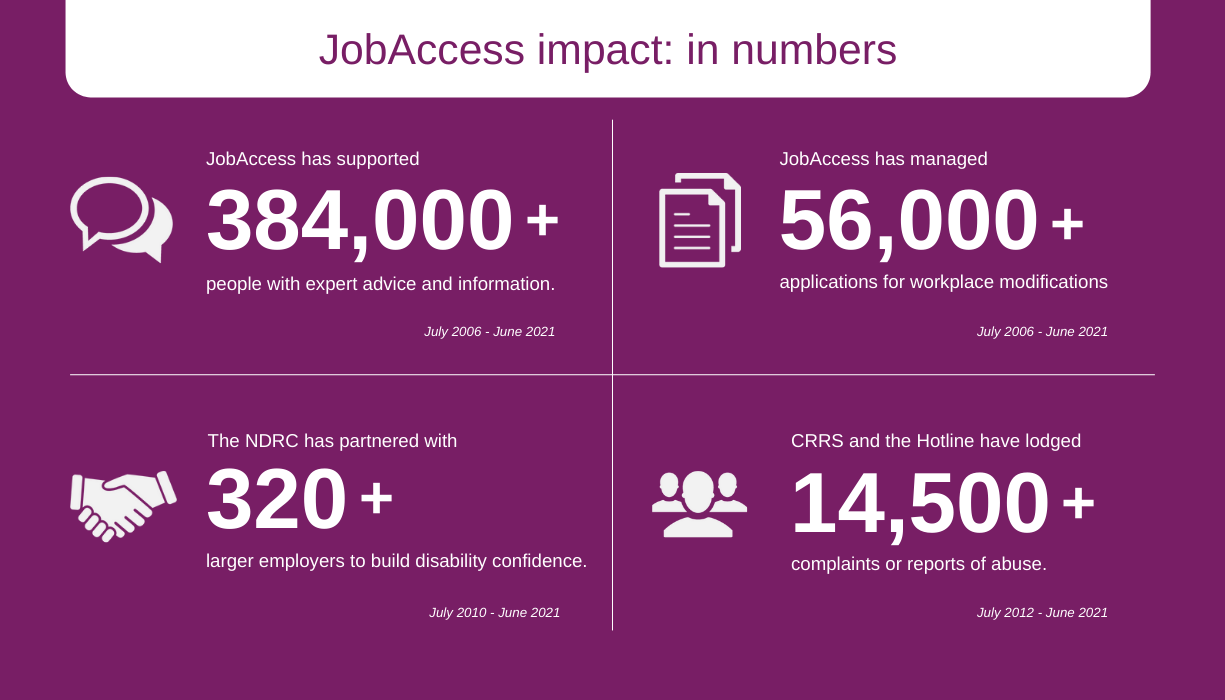
The JobAccess team includes a range of field experts, including allied health professionals, specialists in workplace adjustments, occupational therapists, psychologists and those with experience in training and recruitment strategies for the sustainable employment of people with disability.
“What that means is when a person with disability, employer or service provider calls JobAccess, they speak to front-line specialists from the get-go who can provide advice tailored to their situation,” says Daniel Valiente-Riedl, General Manager at JobAccess.
Simple, innovative changes making disability employment business as usual
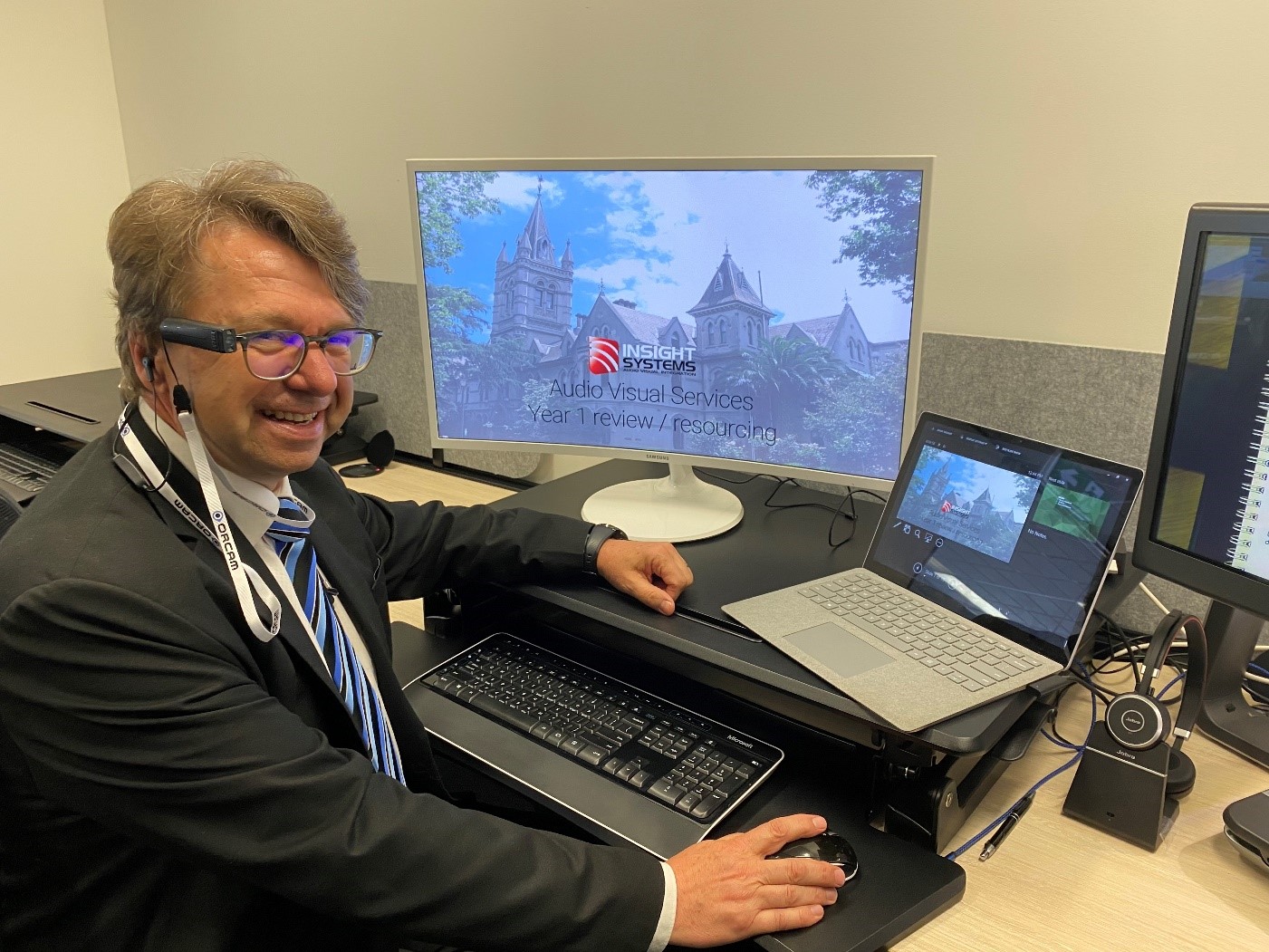
As Head of Managed Services at Insight Systems, Shane is directly responsible for managing high-value accounts and maintaining customer relationships. In recent years, Shane developed Cone Dystrophy and progressively lost his central vision, impacting his ability to perform some core components of his role.
Shane applied for the Employment Assistance Fund through JobAccess. Upon receiving the application, JobAccess organised a free workplace assessment to help identify and recommend simple adjustments.
Soon after, Shane received funding through JobAccess for a ClearView Speech Magnifier that reads all types of text, a portable OrCam reader with wireless Bluetooth-enabled earbuds, and a large monitor for his home office when working offsite.
“The ClearView Magnifier is fantastic as it helps me quickly and efficiently read and review contracts, tenders and other reports. Its touchscreen functionality allows me to navigate complex documents easily and skip to important parts that I need to assess. Reading documents was almost impossible for me, but now I can complete these tasks without having to ask others.”
Shane adds, “The OrCam is life-changing! I attach the compact device to my glass frame, and it reads the information to me through a small speaker via a Bluetooth earbud. It is ingenious for meetings as I can follow the agenda and read content displayed on screens.”
Iris* runs her own business as a milliner and is diagnosed with Multiple Sclerosis (MS).
People with MS commonly experience neuromuscular fatigue and pain. Iris has challenges with writing down information, remembering orders and noting telephone numbers. So JobAccess funded a Smartpen for her to use.
The Smartpen allows Iris to draw a letter, for example, 'H' for Henry and then record the customer’s name, order and phone number. This information is linked to her computer, and the notes are transcribed into her order book.
With the support of a cost-effective and simple solution, Iris can focus her energy on making hats while the administrative tasks are cared for by the Smartpen.
* Name has been changed for privacy.
Shane and Iris are a few of the thousands of Australians with disability who have benefitted from new technology and innovative ideas to maintain their employment.
Sometimes, people with disability may require simple changes to the workplace to do their job. Such changes are known as workplace adjustments.
JobAccess provides expert and confidential advice on workplace adjustments to employers and people with disability, who may be eligible to receive financial assistance through the Australian Government’s Employment Assistance Fund (EAF).
“This service helps address cost as a barrier for employers to making changes that can help people with disability get work, keep work and be more productive,” says Camille Greenwell, Client Support Manager – Workplace Modifications and Training at JobAccess.
She adds, “In most cases, workplace adjustments are simple changes. Not all people with disability will require adjustments. But, for those who do, it can increase their ability to work and be employed for longer.”
Changing employer attitudes to create inclusive employment opportunities
It is well established that inclusive businesses representing the diversity of the community they serve invariably draw long-term benefits. A recent study found that enabling workplace inclusion can drive economic dividends to the tune of $5 billion annually due to higher creativity and innovation3.
So what holds employers back from hiring people with disability?
A study by the Department of Social Services found that while 77 per cent of businesses were open to hiring people with disability, only 35 per cent of them demonstrated a behavioural commitment to do so. Lack of awareness about available supports and poor understanding of disability employment are the main sources of hesitation among employers4.
“A proven way to overcome doubts or concerns is by gaining exposure to the concept,” says Karla Fernee, Employer Engagement Team Lead at JobAccess. “And, the National Disability Recruitment Coordinator (NDRC) does just that.”
The Australian Government’s NDRC program is designed to build disability confidence among employers. The NDRC partners with larger employers across Australia to improve their ‘disability fitness’ through free tailored 12-month partnerships.
As part of the partnership, dedicated NDRC Professional Advisers work alongside employers to help identify and remove workplace barriers to improve equitable access to employment for people with disability.
“The program encourages employers to think outside the box when it comes to recruiting and retaining a diverse workforce. One size does not fit everyone, and that’s true for all of us when it comes to employment,” says Karla.
Since 2010, the NDRC has partnered with over 320 larger organisations across public and private industries based in major city centres and regional areas.
Canberra-based technology company, Seeing Machines, is one of them.
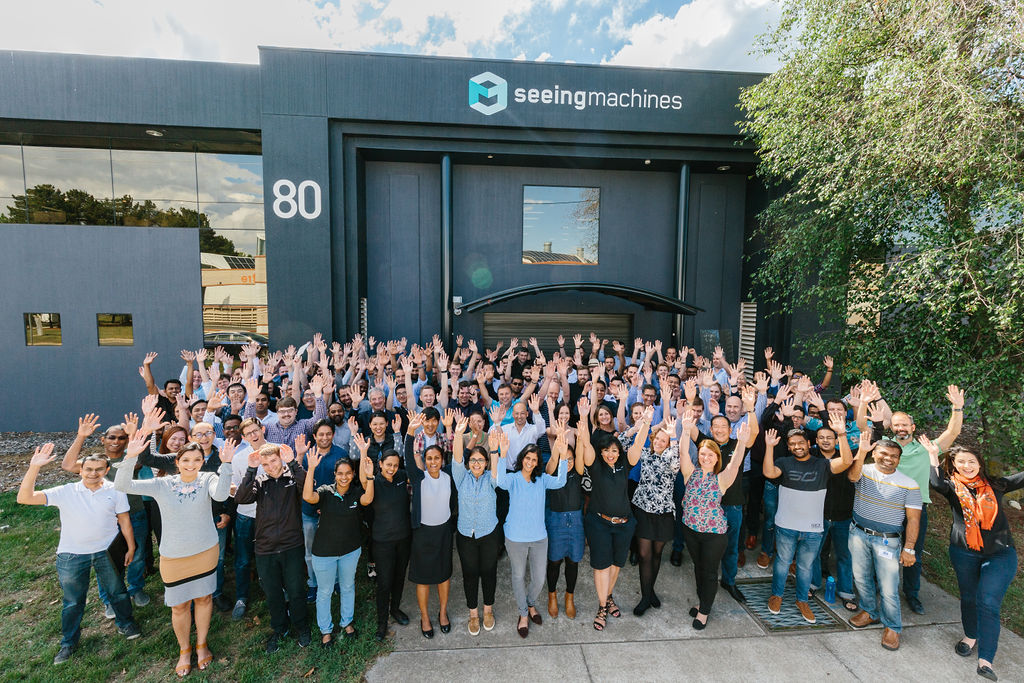
To encourage disability employment, Seeing Machines introduced Project Embrace, an initiative to create targeted opportunities in Canberra for the local community of neuro-diverse candidates, including people on the autism spectrum.
“Our goal was to provide people with disability a pathway into meaningful employment and identify skills to fit with the role of an analyst,’’ explains Gillian Smith, Learning and Development Manager at Seeing Machines. “The NDRC became a vital partner in the disability employment space,” she adds.
A dedicated NDRC Professional Adviser worked with Seeing Machines on a wide range of employment matters, from conducting a tailored recruitment review to delivering disability awareness training for their staff.
Project Embrace is already delivering benefits. Within its first year, the initiative has seen Seeing Machines diversify its workforce by employing 18 apprentices with neuro-diverse conditions and six managers to support the team.
Improving outcomes for jobseekers and service providers
JobAccess also delivers two independent and impartial reporting services – the Complaints Resolution and Referral Service (CRRS) and the National Disability Abuse and Neglect Hotline (the Hotline).
The CRRS is a free service for people with disability who are users of Disability Employment Services (DES), Australian Disability Enterprises (ADE) and advocacy services. It exists for people with disability to discuss any problem they may have with any of these Australian Government-funded services.
“The CRRS works as mediators between a participant and a service, obtaining feedback and providing a service improvement suggestion when necessary,” explains Kate Wilder, Team Leader – CRRS and the Hotline.
The CRRS takes an outcome-focused approach to resolve complaints.
Kate says, “The CRRS doesn’t take sides. We don’t advocate on anyone’s behalf. Instead, we work with both parties to identify the appropriate resolution or outcome. We ensure that the individuals who use the service are listened to and treated with respect and understanding.”
DES providers who have participated in the CRRS process have also benefited from the resolution process, gaining useful feedback that has helped them improve their work processes to better engage with both job seekers and employers.
On the other hand, the Hotline is a service to report the abuse and neglect of people with disability. Anyone can contact the Hotline, including family members, friends, service providers or a person with disability. The service works with callers to find appropriate ways of dealing with reports of abuse and neglect of people with disability.
Since 2012, the CRRS and the Hotline have lodged more than 14,500 complaints or reports of abuse.
A positive impact for everyone, everyday
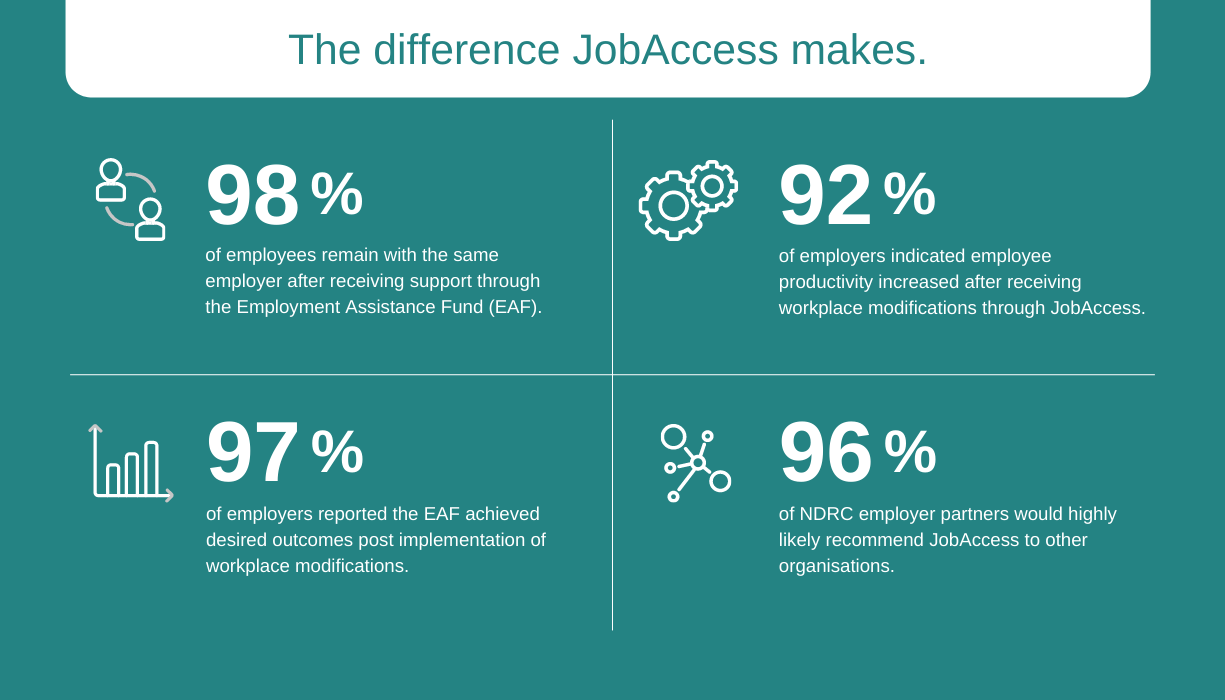
JobAccess Advisers use a case management approach, seeing each unique query through to resolution with a customer-centric focus.
Organisational Excellence Manager at JobAccess, Nicola Tuckwell, says, “JobAccess has managed over 56,000 applications for workplace modifications since 2006. And, each one has made a difference.”
JobAccess surveys employers 13 weeks after implementing workplace adjustments and supports funded by the Employment Assistance Fund (EAF).
The feedback JobAccess has received from employers shows that:
- 98 per cent of employees with disability were still employed three months after receiving funding support through the EAF.
- 92 per cent of employers indicated that employees were more productive post-implementation of workplace adjustments.
- 97 per cent of employers indicated that the EAF provided the help it was intended to.
“It means simple, innovative changes can make a big difference for people with disability to perform at their highest potential and stay employed while employers can retain their best talent,” says Nicola.
Similarly, the NDRC program draws a positive response from its employer partners.
Ninety-six per cent of NDRC partners who’ve completed the 12-month program would highly recommend JobAccess to other organisations.
Karla says, “This speaks volumes about the broader impact that JobAccess and the NDRC make within boardrooms by removing systemic, attitudinal and environmental barriers, increasing employer confidence and improving employment outcomes for people with disability.”
This singular focus on the individual and employer has drawn global recognition for the program’s innovative approach to improving employment outcomes for Australians with disability.
The United Nations Public Service Award and Essl Foundation’s Zero Project initiative have recognised JobAccess for improving the delivery of services5 and innovative policies6, respectively.
Daniel adds, “Getting it right on disability gets it right for everyone.”
He encourages jobseekers, employers and service providers to remember, “You don’t have to go it alone. JobAccess is here to help.”
Sources:
1 People with disability in Australia. Australian Institute of Health and Welfare. October 2020. https://www.aihw.gov.au/reports/disability/people-with-disability-in-australia/contents/employment/unemployment#Unemployment%20rate
2 Business Conditions and Sentiments. Australian Bureau of Statistics. June 2021. https://www.abs.gov.au/statistics/economy/business-indicators/business-conditions-and-sentiments/latest-release#staff-shortages
3 The economic benefits of improving social inclusion. Deloitte. August 2019. https://www2.deloitte.com/au/en/pages/economics/articles/economic-benefits-improving-social-inclusion.html
4 Building Employer Demand Research Report. Department of Social Services. July 2018. https://www.dss.gov.au/disability-and-carers/publications-articles/building-employer-demand-research-report
5 Disability employment advice service wins UN Award. Department of Education, Skills and Employment. June 2008. https://ministers.dese.gov.au/oconnor/disability-employment-advice-service-wins-un-award
6 Innovative Policy 2017 on Employment and Vocational Education & Training. Zero Project. https://zeroproject.org/policy/one-platform-for-all-from-assistance-to-incentives-for-employers/
Last updated:
